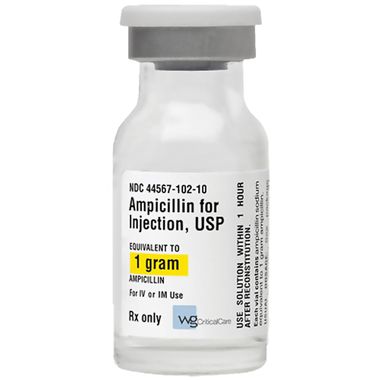SAVE 15% OFF 15% OFF Use Code EPX15 *

Ampicillin for Dogs, Cats & Cattle - Injection USP (1 g) - [Infection Treatment]
- Description
- Directions
- Reviews
Description
Ampicillin for Injection USP for injectable suspension has proved effective in the treatment of many infections previously beyond the spectrum of penicillin therapy. This drug is particularly indicated in the treatment of the following infections caused by susceptible strains of organisms:
Key Benefits
- Broad-spectrum applications in a variety of species makes this a useful product to have on hand.
- It has a shorter milk and slaughter withdrawal time than other products in the same class of drugs, meaning less loss of profit.
- Good alternative to administering oral antibiotics to dogs and cats.
Indications
Ampicillin for Injection, USP is indicated in the treatment of infections caused by susceptible strains of the designated organisms in the following conditions:
Respiratory tract Infections caused by S. pneumoniae (formerly D. pneumoniae). Staphylococcus aureus (penicillinase and nonpenicillinase-producing), H. influenzae, and Group A beta-hemolytic Streptococci.
Bacterial Meningitis caused by E. coli, Group B Streptococci, and other Gram-negative bacteria (Listeria monocytogenes, N. meningitidis). The addition of an aminoglycoside with ampicillin may increase its effectiveness against Gram-negative bacteria.
Septicemia and Endocarditis caused by susceptible Gram-positive organisms including Streptococcus sp., penicillin G-susceptible staphylococci, and enterococci. Gram-negative sepsis caused by E. coli, Proteus mirabilis and Salmonella sp. respond to ampicillin. Endocarditis due to enterococcal strains usually respond to intravenous therapy. The addition of an aminoglycoside may enhance the effectiveness of ampicillin when treating streptoccoccal endocarditis.
Urinary Tract Infections caused by sensitve strains of E. coli and Proteus mirabilis.
Gastrointestinal Infections caused by Salmonella typhosa (typhoid fever), other Salmonella sp., and Shigella sp. (dysentery) usually respond to oral or intravenous therapy.
Bacteriology studies to determine the causative organisms and their susceptibility to ampicillin should be performed. Therapy may be instituted prior to obtaining results of susceptibility testing.
It is advisable to reserve the parenteral form of this drug for moderately severe and severe infections and for patients who are unable to take the oral forms. A change to oral ampicillin may be made as soon as appropriate.
To reduce the development of drug-resistant bacteria and maintain the effectiveness of Ampicillin for Injection, USP and other antibacterial drugs, Ampicillin for Injection, USP should be used only to treat or prevent infections that are proven or strongly suspected to be caused by susceptible bacteria. When culture and susceptibility information are available, they should be considered in selecting or modifying antibacterial therapy. In the absence of such data, local epidemiology and susceptibility patterns may contribute to the empiric selection of therapy.
Indicated surgical procedures should be performed.
Directions
The dosage of ampicillin of injectable suspension will vary according to the animal being treated, the severity of the infection and the animal's response.
Dogs & Cats The recommended dose for dogs or cats is 3 mg/lb of body weight administered twice daily by subcutaneous or intramuscular injection.
Cattle and calves Including Non-Ruminating (Veal Calves) From 2mg to 5 mg/lb of body weight once daily by intramuscular injection. Do not treat for more than 7 days. In all species, 3 days treatment is usually adequate, but treatment should be continued for 48 to 72 hours after the animal has become afebrile or asymtomatic.
Contraindications:
A history of allergic reactions to penicillin, cephalosporins or their analogues should be considered a contraindication for the use of this agent.
Precautions:
Because it is a derivative of 6-aminopenicillanic acid, ampicillin for injectable suspension has the potential for producing allergic reactions. If they should occur, ampicillin for injectable suspension should be disontinued and the subject treated with the usual agents (antihistamines, pressor amines, corticosteroids).


